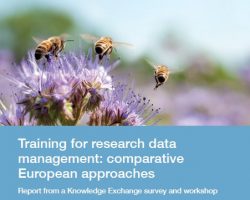Research data management training
An international comparison of approaches
 On behalf of Knowledge Exchange (KE), InformAll has produced a report, available here, on approaches to research data management (RDM) training undertaken by universities and infrastructure providers. This work has helped to reinforce InformAll’s interest in skills and competences associated with research data – an important component of information literacy.
On behalf of Knowledge Exchange (KE), InformAll has produced a report, available here, on approaches to research data management (RDM) training undertaken by universities and infrastructure providers. This work has helped to reinforce InformAll’s interest in skills and competences associated with research data – an important component of information literacy.
In today’s changing research environment, there is a need for researchers at all stages in their careers, along with research support staff, to nurture their skills and know-how in the management of research data. The KE report presents the outcomes from two strands of activity:
- A survey, undertaken between December 2015 and January 2016, which collected information on current practice around RDM training, in order to provide an overview of the RDM training landscape in different European countries;
- A workshop to share successful approaches to RDM training and capacity building provided within institutions and by infrastructure; this took place in London on 9-10 February 2016.
Questions addressed included target groups for training, types of research data, methods of training and experiences and lessons learned. RDM, as covered in the report, comprises the different components of the research data lifecycle, from data creation to data preserving, sharing and re-use. It is also an integral part of the wider research process, contributing the standards and principles of research, and applicable not just to the research data lifecycle, but throughout the lifecycle of research projects as a whole. RDM skills and training thus form a necessary component of the broader professional development of researchers and other professional groups that support researchers.
Moreover, RDM skills apply to all disciplines. The report emphasises the extent to which the training effort is spread evenly over the range of broad subject areas. And it also relates to all stages of research careers, from PhD students onwards, as well as to research support professions such as librarians and research administrators. It follows that the relevance of RDM skills is widely applicable, and the potential audiences for RDM training correspondingly large.
KE is a co-operative effort between between five key national organisations in Europe: CSC in Finland, DEFF in Denmark, DFG in Germany, Jisc in the UK and SURF in the Netherlands. It is tasked with developing infrastructure and services to enable the use of digital technologies to improve higher education and research.
![InformAll [logo]](https://www.informall.org.uk/wp-content/themes/informall/assets/img/informall-logo.svg)